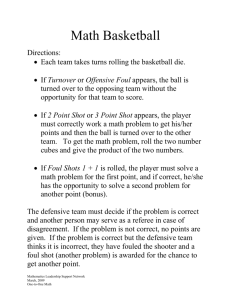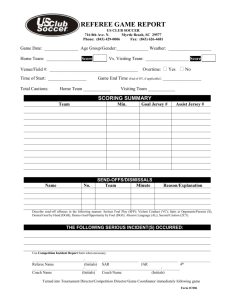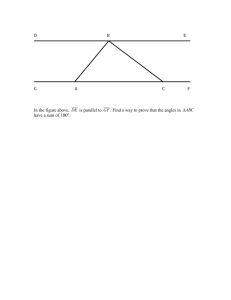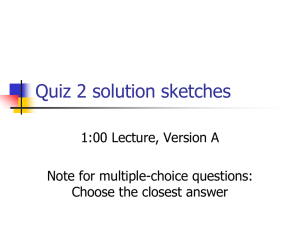Trade-off Analysis of Decision Support Systems for Time Sensitive Operations/Referee’s Assistant Paik
advertisement
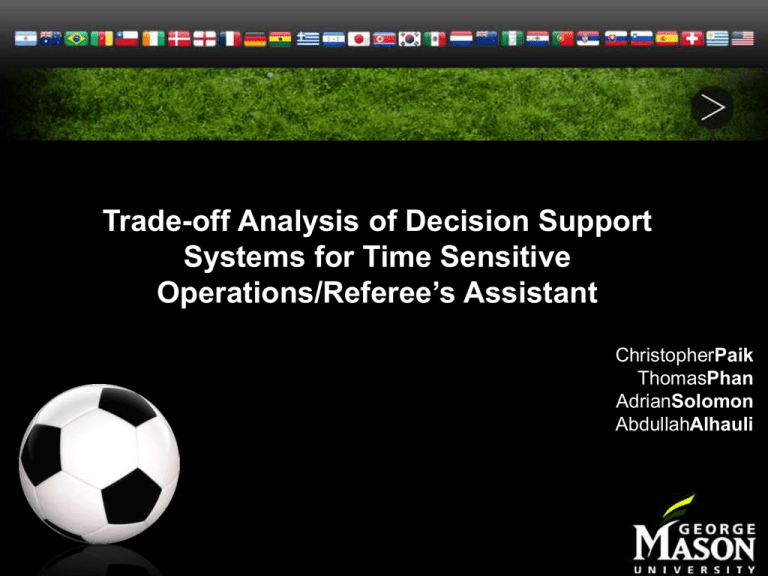
Trade-off Analysis of Decision Support Systems for Time Sensitive Operations/Referee’s Assistant ChristopherPaik ThomasPhan AdrianSolomon AbdullahAlhauli 2 Source: http://www.nationalpost.com/sports/Germans+crush+English+defence/3208432/story.html 3 AGENDA • REFEREE PERFORMANCE • COMPLEXITY • STAKEHOLDER ANALYSIS • NEED STATEMENT • PROBLEM STATEMENT • MISSION REQUIREMENTS • DESIGN OF EXPERIMENT • VALUE HIERARCHY/ UTILITY • CONCLUSION 4 • QUESTIONS WHAT IS Consist SOCCER? of: •Official Referee •Runs Diagonal of field (To maximize Line of Sight) •Grants Final Decision(s) •Executes Laws of the Game •Assistant Referees •Identifies Offside •Aids Official to identify infringements •4th Official •Soccer Players 5 CURRENT REFEREE STATUS Only 96.88% of Goal Decisions in 2010 World Cup were correct: • 142 of the 145 goals awarded correctly •13 goals were correctly disallowed for offside • Two more goals should have been allowed In the League Managers Association (LMA) the Additional Assistant Referee (AAR) experiment concluded that: • Only 78.8% for 5 types of decisions (Goal Kicks, Corner Kicks Free Kicks, Throw Ins, & Advantages) were Correct • 10.2% were incorrect • 10.9% was inconclusive. 6 GAME IS GROWING • Players are running faster and are covering more distances. 9 km in 1990’s, 11 km in 2004, and 15 km in 2010. Based on our Subject Matter Expert, amount of decisions per game: 627 game situation decisions 7 POPULARITY 3500000 140000 3000000 Virginia 120000 Connecticut 2500000 Iowa 100000 Florida 2000000 Utah 80000 Total 1500000 60000 1000000 40000 500000 20000 2008 2006 2004 2002 2000 1998 1996 1994 1992 1990 1988 1986 1984 1982 1980 1978 0 1976 0 1974 Number of Registered US Youth Soccer Players 160000 Time (Years) 8 Total Number of Registered US Youth Soccer Players Registered US Youth Soccer Players vs. Time WHAT’S AT STAKE • 17 teams won 1-0 out of the 64 matches during 2010 World Cup Average Goal Per Match in World Cups vs. Time 6 5 # of Average Goals • The importance of a goal being scored is increasing due to the decrease in average number of goals scored 4 3 2.27 2 1 0 • Spain, who won the 2010 World Cup, won 5 out-of 7 matches 1-0 Time (Years) Source: FIFA 2010 World Cup Technical Report 9 WHAT IS AT STAKE? • Legitimacy of sport • Fan base viewership (increasing popularity in other sports) • MONEY: TV Revenue, Merchandise/Ticket Sales, TV Broadcasting rights, player trades $3,500,000,000 900 $ on rights deals 800 $3,000,000,000 $ spent on games rights $2,500,000,000 700 600 $2,000,000,000 500 $1,500,000,000 400 300 $1,000,000,000 200 $500,000,000 100 Time (Years) 2013 10 2012 2011 2010 2009 2008 2007 2006 2005 2004 2003 2002 2001 2000 1999 1998 1997 1996 1995 1994 $0 1993 0.000001 Overall Revenue from Broadcasting rights 1000 1992 Total $ Spent on games rights annually (Millions) British Sky Broadcasting TV Rights Value in English Premier League vs. Time 10 REFEREES ARE HUMAN Referees are limited to: • ONE line of sight • Running Speed/ Degree of Fitness • Limited ability to process event data (e.g. Offside: Flash-Lag effect; Referees can not simply see two events at the same time) 11 11 REFEREE WORKLOAD • Referee performance shows majority of the 2nd half of a match outputting at 85-95% Maximum Heart Rate • Total distance covered by Referees must match players increased significant distance covered. 9 km during the 1990s, 11 km in 2004 and 15 km in 2010 12 WHY THIS IS A PROBLEM 13 STAKEHOLDER ANALYSIS • IFAB (International Football Association Board) are key holders of the “Laws of the Game” • FIFA (Federation Internationale de Football Association) and IFAB are governing bodies of Soccer 14 STATEMENTS PROBLEM STATEMENT: Currently, the game has grown more complex, but humans are limited by their capabilities, creating a growing gap between the needed performance of the officiating system and the complexity. IFAB/FIFA (Governing bodies of soccer) have failed to Identify and address this growing gap. NEED STATEMENT: There is a need to increase the percent accuracy of the Referee in game adjudication of a fair game. 15 MISSION REQUIREMENTS • The system shall satisfy regulations and laws of the governing bodies of soccer •The system shall reduce Referee workload • The system shall relay information to the referee within 5 seconds of the game incident 16 UTILITY Utility Accuracy (Percentage) Usability (Learning Curve Rating) Speed (Time to Result) Time to make decision (seconds) % Accuracy will come from model Time to transmit decision (seconds) Cost Implementation (Dollars) Operation (Dollars, Annual) Weights will be collected from stakeholder surveys 17 METHODOLOGY • Simulate the effects of proposed Decision Support Systems on the Accuracy of a Soccer Official. • Simulate the Factors that hinder a Referee’s ability to accurately judge an event • Simulate the probability of an accurate decision based on the Decision Support System’s characteristics • Perform a Trade-off Analysis comparing decision support systems to assist the soccer official 18 CALL TABLE Event Affect Freq kicks or attempts to kick an opponent - in opponent's penalty area Very High 10 10000 • trips or attempts to trip an opponent - in opponent's penalty area Very High 10 10000 • jumps at an opponent - in opponent's penalty area Very High 10 10000 • charges an opponent-in opponent's penalty area Very High 10 10000 • pushes an opponent-in opponent's penalty area Very High 10 10000 • tackles an opponent- in opponent's penalty area Very High 10 10000 holds an opponent- in opponent's penalty area Very High 10 10000 • handles the ball deliberately (except for the goalkeeper within his own penalty area)- in opponent's penalty area Very High 10 10000 Importance Value = Frequency * Effect on Outcome 19 Importance CALL TABLE Freq % Blind Angle 33 54.76 Horizont al Angle of Parallax 6 11.9 Visual Field 27 47.62 Speed 18 38.1 Distance 18 38.1 26% 24% Elsewhere Penalty Area 52% Offensive 3rd 20 DISTANCE The Distance will be measured from the Event Location to the Referee Location. Referee Location Event Location Distance = |Referee Location – Event Location| 21 DURATION The Duration is defined as the amount of time an event takes to occur Duration = Finish Time – Start Time 22 BLIND ANGLES The Blind Angles are defined as the angles that obstruct a system component view of the play Blind Angle = |Obstructed View°Initial – Obstructed View°Final | 23 ANGLE OF PARALLAX The Angle of Parallax is defined as the degree of separation from the Optimal Viewing Angle and the Actual Viewing Angle. Angle of Parallax = |Optimal Angle° – Actual Angle° | 24 VISUAL FIELD The Visual Field is defined as the area viewable by a single System Component. Event 2 Event 1 Visual Field = |Visual Field°left – Visual Field°right | 25 SCOPE The most important factors: •Distance •Blind Angles • Angle of Parallax • Duration • Visual Field Event’s Analyzed will be limited to the 42 calls with the most impact on the game: • Fouls • Goals • Play Stoppage • Disciplinary 26 SIMULATION DESIGN Event Function Ball Position Function Ref Position Function Probability of Accurate Call Function ∑ Total System Accuracy Foul 1 – 40% Foul 2 – 60% ... … 27 SIMULATION DESIGN Ball Position Function Event Function Probability of Accurate Call Function Ref Position Function 0,0 0 1 2 0 0 0.1 0.0125 1 0.1 0.1 0.0125 2 0.0125 0.0125 0.0125 3 0 0 0 4 0 0 0 0,1 0 1 2 0 0.1 0.1 0.0125 1 0 0.1 0.0125 2 0.1 0.1 0.0125 3 0.0125 0.0125 0.0125 4 0 0 0 0,2 0 1 2 0 0.0125 0.0125 0.0125 1 0.1 0.1 0.0125 2 0 0.1 0.0125 3 0.1 0.1 0.0125 4 0.0125 0.0125 0.0125 3 0 0 0 0 0 3 0 0 0 0 0 3 0 0 0 0 0 4 0 0 0 0 0 4 0 0 0 0 0 4 0 0 0 0 0 ∑ Total System Accuracy Foul 1 – 40% Foul 2 – 60% ... … 5 1,0 0 1 2 3 0 0 0.1 0 0.1 0.0125 0 1 0.1 0.1 0.1 0.0125 0 2 0.0125 0.0125 0.0125 0.0125 0 3 0 0 0 0 0 4 0 0 0 0 5 1,1 0 1 2 3 0 0 0.1 0.1 0.1 0.0125 0 1 0.1 0 0.1 0.0125 0 2 0.1 0.1 0.1 0.0125 0 3 0.0125 0.0125 0.0125 0.0125 0 4 0 0 0 0 5 1,2 0 1 2 3 0 0 0.0125 0.0125 0.0125 0.0125 0 1 0.1 0.1 0.1 0.0125 0 2 0.1 0 0.1 0.0125 0 3 0.1 0.1 0.1 0.0125 0 4 0.0125 0.0125 0.0125 0.0125 4 0 0 0 0 0 4 0 0 0 0 0 4 0 0 0 0 0 5 0 0 0 0 0 5 0 0 0 0 0 5 0 0 0 0 0 R = Random Number ballPosition = bp If (R == nextPositionCDF) ballPosition = nextPosition 28 SIMULATION DESIGN Ball Position Function Event Function Ref Position Function If (Random Number == specificEventTypeCDF) EventType = specificEventType EventDuration = Random Number(0,X) If(Random Number == specificLocation) Location = specific Location return Event & Location Probability of Accurate Call Function ∑ Total System Accuracy Foul 1 – 40% Foul 2 – 60% ... … Freq % Tripping 23 54.76 Out of Bounds 4 9.52 Goal 5 11.9 Push 20 47.62 …. …. ….. ….. .... …. 26% Elsewhere Event 24% ………... Penalty Area Event Type Event Location Event Duration 52% Offensive 3rd 29 SIMULATION DESIGN Ball Position Function Event Function Ref Position Function Probability of Accurate Call Function ∑ Foul 1 – 40% Foul 2 – 60% ... … Total System Accuracy Ref Position X,Y RefPositionY = RefereeDiagonalPosition(BallPositionX) Return BallPositionX, RefPositionY *Assume Referee will always be in position according to graph (No fatigue, No straying off path) 30 SIMULATION DESIGN Ball Position Function Event Function Ref Position Function Probability of Accurate Call Function ∑ Foul 1 – 40% Foul 2 – 60% ... … Total System Accuracy System Data Location of Components (L) # of LOS (S) Processing Time (T) Visual Field (V) Accurate Range (R) Accuracy Probability due to: Input Data Event Blind Angles (EB) Event Type (ET) Event Location (EL) Event Duration (ED) Referee Position Distance + Blind Angles + Angle of Parallax + Duration + Visual Field Probability that a single event will be called accurately EX – Tripping Foul = 78% of Accurate Call 31 SIMULATION DESIGN Ball Position Function System Data Location of Components (L) # of LOS (S) Processing Time (T) Visual Field (V) Accurate Range (R) Event Function Probability of Accurate Call Function Ref Position Function ∑ Foul 1 – 40% Foul 2 – 60% ... … Total System Accuracy Event Data Event Blind Angles (EB) Event Type (ET) Event Location (EL) Event Duration (ED) Distance = |EL – L| P(Accuracy) DISTANCE R Distance = P(Accuracy due to Distance) 32 SIMULATION DESIGN Ball Position Function System Data Location of Components (L) # of LOS (S) Processing Time (T) Visual Field (V) Accurate Range (R) Event Function Ref Position Function Probability of Accurate Call Function ∑ Foul 1 – 40% Foul 2 – 60% ... … Total System Accuracy Event Data Event Blind Angles (EB) Event Type (ET) Event Location (EL) Event Duration (ED) BLIND ANGLES Location of Components P(Accuracy) Event Blind Angles Blind Angles = P(Accuracy from Blind Angles) Angle of View 33 SIMULATION DESIGN Ball Position Function System Data Location of Components (L) # of LOS (S) Processing Time (T) Visual Field (V) Accurate Range (R) Event Function Probability of Accurate Call Function Ref Position Function ∑ Foul 1 – 40% Foul 2 – 60% ... … Total System Accuracy Event Data Event Blind Angles (EB) Event Type (ET) Event Location (EL) Event Duration (ED) Optimal View Angle Actual View Angle P(Accuracy) ANGLE OF *will only apply to Off Sides, Out of Bounds, and Goal Events PARALLAX Optimal Angle = P(Accuracy from Angle of Parallax) Angle of View 34 SIMULATION DESIGN Ball Position Function System Data Location of Components (L) # of LOS (S) Processing Time (T) Visual Field (V) Accurate Range (R) Event Function Ref Position Function Probability of Accurate Call Function ∑ Foul 1 – 40% Foul 2 – 60% ... … Total System Accuracy Event Data Event Blind Angles (EB) Event Type (ET) Event Location (EL) Event Duration (ED) Event Duration Processing Time P(Accuracy) DURATION T = P(Accuracy from Event Duration) Event Duration 35 SIMULATION DESIGN Ball Position Function System Data Event Function Probability of Accurate Call Function Ref Position Function ∑ Foul 1 – 40% Foul 2 – 60% ... … Total System Accuracy Event Data Location of Components (L) # of LOS (S) Processing Time (T) Visual Field (V) Accurate Range (R) Event Blind Angles (EB) Event Type (ET) Event Location (EL) Event Duration (ED) VISUAL FIELD EL2 Θ V1 V2 L1 Θ = acos(V1 ∙ V2) P(Accuracy) EL1 0 = P(Accuracy from Visual Field) V 60 180 36 SIMULATION DESIGN Ball Position Function Event Function Ref Position Function Probability of Accurate Call Function ∑ Foul 1 – 40% Foul 2 – 60% ... … Total System Accuracy PROBABILITY EQUATION Probabilities due to Distance + Blind Angles + Angle of Parallax + Duration + Visual Field *Each will have different weights according to Type of Event = P(Accurate Call for Event) 37 SIMULATION DESIGN Ball Position Function Event Function Ref Position Function Event 1 – 40% Event 2 – 60% Event 3 – 50% … … … AVG all Probabilities Probability of Accurate Call Function ∑ Foul 1 – 40% Foul 2 – 60% ... … Total System Accuracy Total System Accuracy 38 VALIDATION Must compare all Simulation Data against Actual Games Sample Size needed to Achieve a C.I. of 10% with a 95% Level of Confidence: Z2 * p(1-p) = 1.962 * (.5)(1-.5) = 96 games (CI)2 .12 39 HOUSE OF QUALITY Multiple Lines of Sight (Technology) Change Diagonal Path Blind Angle X Low Vertical Angle of Parallax X X X Horizontal Angle of Parallax X X X Speed X Low Low Distance X Goal Only Goal Only Visual Field X HOW WHAT Low Sensor (microchip in ball) Global Positioning Satellite (GPS) X Sensors & GPS X 40 PROJECT PLAN 41 BUDGET AS OF 12/1/10 Earned Value Management 25000 20000 15000 Actual Value (Cumulative) Planned Value (Cumulative) 10000 Earned Value 5000 0 1 2 3 4 5 6 EV AC 19148 18106 7 8 9 10 11 12 13 14 15 PV CV% SV% CPI SPI 21000 0.0544 -0.088 1.0575 0.9118 42 RISK MITIGATION Risk: • Data Collection Mitigation Strategy: • Allocate more resources to collecting Data • Started Simulation Building a month ahead of schedule. 43 References [1] N/A. (2007, July). 265 million playing football [Online]. Available: http://www.fifa.com/mm/document/fifafacts/bcoffsurv/emaga_9384_10704.pdf [2] N/A. TV Data [Online]. Available: http://web.archive.org/web/20070922225713/http://fifa.com/aboutfifa/marketingtv/factsfigures/tvdata.html [3] Stephen Master. U.S. Ratings Climb 68% for 2010 World Cup [Online]. Available: http://blog.nielsen.com/nielsenwire/media_entertainment/usa-ratings-up-big-in-2010-world-cup/ [4] Alex Burmaster. Official FIFA Website Scores Biggest in Brazil [Online]. Available: http://blog.nielsen.com/nielsenwire/global/official-fifa-website-scoresbiggest-in-brazil/ [5] N/A. Laws of the Game 2010/2011 [Online]. Available: http://www.fifa.com/mm/document/affederation/generic/81/42/36/lawsofthegame_2010_11_e.pdf [6] Dan Wetzel. (2010, July 11). World Cup winner will cash in too [Online]. Available: http://g.sports.yahoo.com/soccer/world-cup/news/world-cup-winner-willcash-in-too--fbintl_dw-prizemoney071110.html [7]N/A. (2010, June 9-10). FIFA Financial Report 2009 [Online]. Available: http://www.fifa.com/mm/document/affederation/administration/01/18/31/86/fifa_fr09_en.pdf [8] N/A. 2010 FIFA World Cup South Africa Technical Report and Statistics [Online]. Available: http://www.fifa.com/mm/document/affederation/technicaldevp/01/29/30/95/reportwm2010_web.pdf [9] Additional Referee Experiment Background Paper – FIFA 08-28-09 [10] N/A. 2010, May 18. Five-referee experiment to continue [Online]. Available:http://www.uefa.com/uefa/footballfirst/matchorganisation/refereeing/news/newsid=1489596.html#five+referee+trial+continues [11] N/A. 2010, July 21. IFAB approves additional assistant referee experiment [Online]. Available: http://www.fifa.com/aboutfifa/federation/releases/newsid=1276442.html [12] N/A. 2009, September 17. FIFA AAR Program [Online]. Available: http://www.proreferee.com/article/757 written by ProReferee Staff; published 17 Sept 2009 [13] Sophie Freeman. 2010, June 29. FIFA President Sepp Blatter apologises over disallowed England goal and concedes it’s time to talk about technology [Online]. Available: http://www.dailymail.co.uk/news/article-1290538/World-Cup-2010-Sepp-Blatter-apologises-concedes-time-talk-technology.html [14] N/A. [Online]. Available: http://www.cairos.com/unternehmen/index.php Figure 1.5; Courtesy of: (Jesse Chula; 27 Jun, 2010). Available: http://view.picapp.com/pictures.photo/entertainment/germany-goalkeeperneuer/image/9233659?term=People%253a0.714%253a%2522Frank%2bLampard%2522+frank+lampard&scomp=pis & (Sophie Freeman; 29 June 2010). Available: http://www.dailymail.co.uk/news/article-1290538/World-Cup-2010-Sepp-Blatter-apologises-concedes-time-talk-technology.html [15] Paul Mungra, Referee Role Overview. Private Conversation. [16] N/A. 2010, August. Goal-line technology – Getting it right [Online]. Available: http://www.wipo.int/wipo_magazine/en/2010/04/article_0001.html [17] Accurate and Reliable [Online]. Available: http://www.hawkeyeinnovations.co.uk/?page_id=1011 [18] Figure1.4 Courtesy of: Mandeep Sanghera. 2007, July 18. Football turns to technology [Online]. Available: http://news.bbc.co.uk/sport2/hi/football/6903029.stm Questions? 45 ALTERNATIVES Alternative 1: Multiple Lines of Sight (Human) + Multiple Lines of Sight (Technology) around the Offensive 3rd of the field to monitor infringements. Alternative 2: Multiple Lines of Sight (Technology) around the Offensive 3rd of the field + Sensors (microchip in ball) to track ball (goals) and player activity (fouls) 46 CALL TABLE Frequency of Effect on Outcome 30 25 Frequency 20 15 10 5 0 Med High Very High Effect on Outcome of Game 47 Backup Slide Frequency of Affect on Outcome 80 70 60 Frequency 50 40 30 20 10 0 Low Med High Affect on Outcome of Game 48 Very High OPERATIONAL CONCEPT 49
